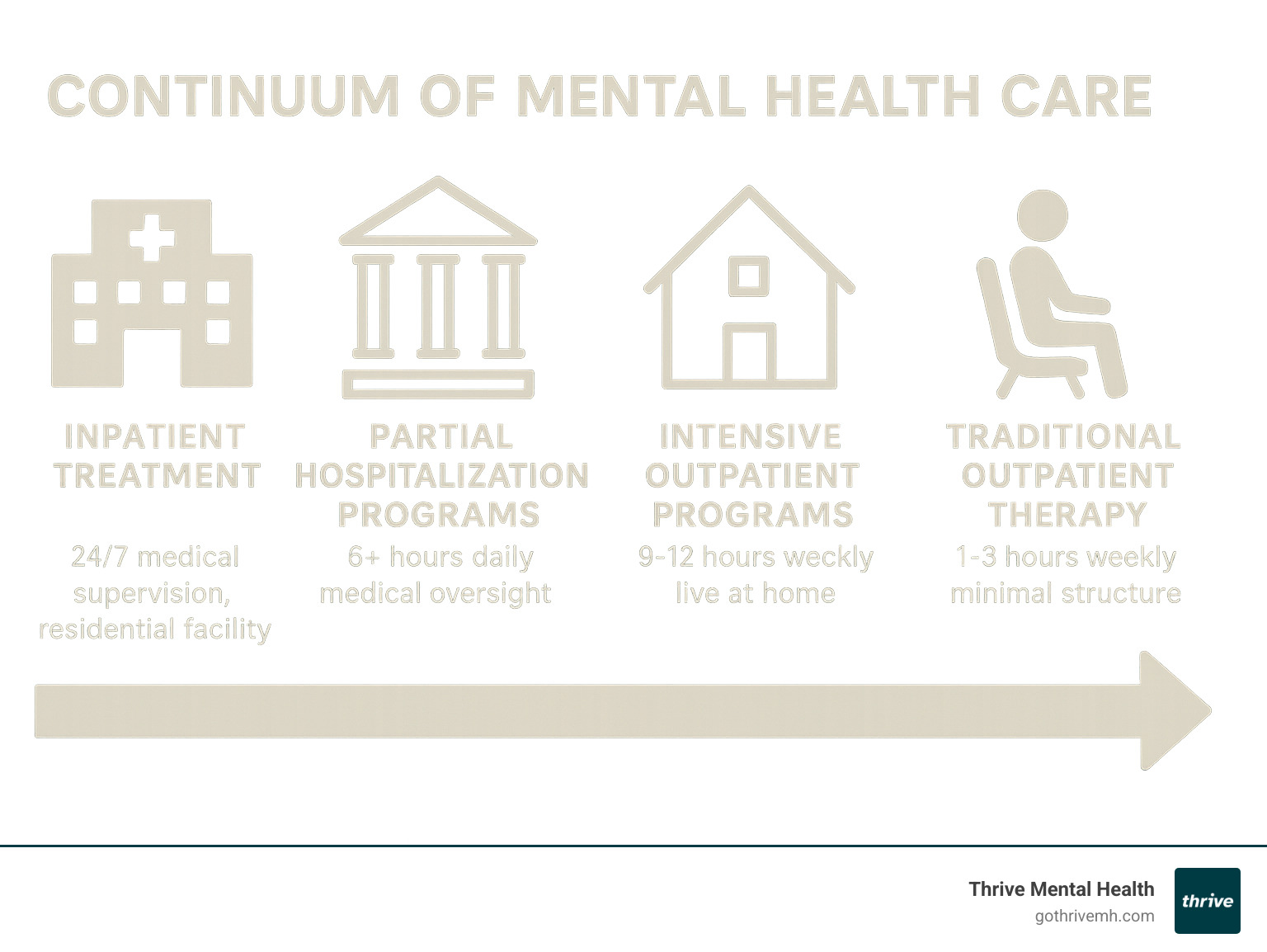Outpatient, But Make It Intensive – A Friendly Guide to IOPs

What Exactly is an Intensive Outpatient Program?
Intensive outpatient programs (IOPs) are structured treatment programs for mental health and substance abuse that provide comprehensive care while you live at home. They are the middle ground between weekly therapy and full-time residential treatment.
Quick Answer: What is an Intensive Outpatient Program?
- Structure: 9-12 hours of treatment per week, typically 3-5 days
- Setting: Outpatient – you live at home, not in a facility
- Components: Group therapy, individual counseling, family sessions, skills training
- Duration: Usually 8-12 weeks with aftercare planning
- Best for: People who need more support than weekly therapy but don’t require 24/7 supervision
IOPs are more intensive than traditional therapy but less restrictive than inpatient treatment, making them ideal for busy professionals who need serious support without pausing their careers. The flexibility of IOPs allows for morning, evening, or virtual sessions. Research shows IOPs are as effective as inpatient treatment for most people with substance use and mental health conditions.
I’m Nate Raine, CEO of Thrive Mental Health. I’ve spent years developing IOPs that bridge the gap between traditional therapy and intensive care. At Thrive, I’ve seen how these programs transform lives while allowing people to maintain their professional and personal commitments.

Intensive outpatient programs terms explained:
Who is IOP For? Conditions Treated and the Ideal Candidate

If you’re struggling with depression, need support after rehab, or find anxiety is sabotaging your work, intensive outpatient programs can help. They bridge the gap between weekly therapy that isn’t enough and residential treatment that feels like too much, offering serious support while you continue living your life.
What Conditions Can an IOP Help With?
The versatility of intensive outpatient programs makes them effective for a wide range of conditions.
- Substance use disorders: IOPs offer intensive support for alcohol or other substance use disorders without the disruption of inpatient care. They are an excellent step-down from residential treatment, providing structure while you transition back to daily life.
- Depression and anxiety disorders: The group therapy and skills-building in IOPs are highly effective for conditions like generalized anxiety disorder, panic disorder, and social anxiety. Realizing you’re not alone while learning practical tools can be transformative.
- Post-traumatic stress disorder (PTSD): IOPs provide a safe space to process trauma while maintaining the stability of home. The mix of individual and group therapy helps develop healthy coping strategies.
- Eating disorders: Our programs integrate therapy with practical support to help you develop a healthier relationship with food and body image.
- Bipolar disorder: The regular check-ins and skills training in an IOP help manage mood episodes, improve medication adherence, and recognize early warning signs.
- Dual diagnosis or co-occurring conditions: IOPs excel at treating co-occurring mental health and substance use issues. The integrated approach addresses both challenges simultaneously.
If you’re curious about how our approach works for mental health, learn more about our mental health IOP program.
Are You a Good Candidate for an IOP?
An IOP might be right for you if you meet certain criteria.
- A stable home environment is crucial. You need a safe, supportive space to practice the skills you’re learning.
- Motivation to participate is key. IOPs require commitment to attending sessions and engaging in the work.
- You don’t need detox or 24/7 supervision. IOPs are for those who are medically stable and not at immediate risk of harm.
- Traditional weekly therapy isn’t enough anymore. An IOP provides an extra boost of intensity and structure.
- You are stepping down from higher levels of care, like inpatient or partial hospitalization programs. An IOP is a perfect bridge back to independent living.
The National Alliance on Mental Illness emphasizes the value of structured outpatient treatment for maintaining progress. The best way to know for sure is to consult with a mental health professional.
For more details on what we look for, check our guide on IOP program requirements.
A Look Inside: The Structure and Components of Intensive Outpatient Programs

Stepping into an intensive outpatient program means weaving powerful, healing experiences into the life you’re already living, not putting it on pause.
What Does a Typical Week in an IOP Look Like?
The word “intensive” refers to the focused, structured nature of the program. Most intensive outpatient programs involve 9 to 12 hours of treatment per week, spread across 3 to 5 days. This flexible scheduling, with morning and evening sessions, allows you to fit treatment around your life.
The key benefit is immediate real-world application. You can learn a coping skill in a morning session and apply it at work that afternoon. This process of learning, practicing, and getting feedback helps you build a robust mental health toolkit while maintaining daily life, attending work, and attending school.
For a deeper dive into the daily experience, you can see what to expect in an IOP.
Core Therapeutic Components
An IOP is designed to build emotional resilience and mental clarity through several core components.
- Group therapy is the heart of most IOPs. It’s a safe space to connect with peers who understand your struggles, practice new skills, and realize you aren’t alone.
- Individual therapy provides one-on-one time with your therapist to work through personal challenges and create a customized treatment plan.
- Family counseling helps loved ones understand what you’re going through and learn how to support your recovery effectively.
- Psychoeducation empowers you by explaining the science behind your condition, helping you understand and manage your brain’s responses.
- Skill-building workshops offer concrete techniques for stress management, emotion regulation, and effective communication.
These components use evidence-based therapies like Cognitive Behavioral Therapy (CBT), which helps change negative thought patterns, and Dialectical Behavior Therapy (DBT), which teaches skills in mindfulness, distress tolerance, and emotion regulation.
To understand how these tools work in our programs, you can learn about CBT and DBT in therapy.
How Long Do Intensive Outpatient Programs Last?
Most intensive outpatient programs run for 8 to 12 weeks, with some following a 90-day model. The exact duration depends on your individual progress.
Completing an IOP is not the end of the journey. Aftercare planning is a critical step to ensure lasting change. Your plan might include stepping down to weekly therapy or joining support groups. The focus shifts to relapse prevention, helping you identify triggers and develop strategies to manage them. Many programs also offer continued support through alumni groups, providing a safety net as you steer life with your new skills.
If you’re curious about this journey, you can read about a personal journey through an IOP.
IOP vs. Other Levels of Care: Finding the Right Fit
Choosing the right level of mental health care can feel like deciding between a band-aid, stitches, or surgery. Intensive outpatient programs fill a crucial gap, offering substantial support without completely disrupting your life. If weekly therapy is like taking vitamins and inpatient treatment is like hospitalization, IOPs are like having a personal trainer for your emotional well-being.
IOP vs. Higher Levels of Care
Let’s compare IOPs to more intensive options like inpatient treatment and partial hospitalization programs (PHPs).
| Feature | Inpatient Treatment (Residential) | Partial Hospitalization Program (PHP) | Intensive Outpatient Program (IOP) |
|---|---|---|---|
| Hours per Week | 24/7 supervision and structured activities | 20-40+ hours/week (e.g., 5-7 days a week, 4-6+ hours/day) | 9-12 hours/week (e.g., 3-5 days a week, 2-4 hours/day) |
| Living Situation | Live at the facility | Live at home or in a supportive environment | Live at home or in a supportive environment |
| Level of Supervision | High (24/7 medical and therapeutic staff) | Moderate to High (daily medical/clinical oversight) | Low to Moderate (structured sessions, but return home) |
| Ideal Candidate | Requires medical detox, 24/7 supervision, or acute crisis stabilization; unsafe at home; needs immersive environment. | Needs intensive daily support but doesn’t require overnight stay; step-down from inpatient. | Needs more than weekly therapy but doesn’t need 24/7 supervision; stable home; wants to maintain responsibilities; step-down from PHP/inpatient. |
| Key Benefit | Complete removal from triggers; constant professional support. | Intensive support with ability to return home; less disruptive than inpatient. | Flexibility to maintain daily life; real-world application of skills. |
The ability to continue living at home during an IOP is a major advantage. You learn coping skills and immediately practice them in your real environment.
However, IOPs aren’t for everyone. Higher levels of care are essential if you need medically-supervised detox, an immersive environment away from triggers, 24/7 medical care, or crisis stabilization.
According to SAMHSA’s guide on clinical issues in IOP, these programs are for people who don’t require round-the-clock supervision but need more support than weekly therapy. At Thrive Mental Health, we help you determine if an IOP is the right fit for your recovery journey.
The Rise of Virtual IOPs and How to Find a Program

Mental health treatment has transformed, moving beyond clinic waiting rooms to become more accessible and flexible. Virtual intensive outpatient programs are a game-changer, allowing you to receive high-quality, evidence-based treatment from the comfort of your home. It’s a approach for busy professionals, parents, or anyone who felt seeking help meant putting life on pause.
Are Virtual Intensive Outpatient Programs Effective?
Can therapy through a screen be as effective as face-to-face meetings? Research provides a clear answer: absolutely. Virtual intensive outpatient programs are just as effective as in-person versions for most mental health and substance use conditions.
The power of telehealth lies in removing barriers to consistent care.
- Accessibility is the great equalizer. Whether you’re in a busy city like Tampa or a quieter part of Florida, virtual IOPs bring expert care to you.
- The comfort of home helps many clients feel more relaxed and open, creating a natural environment for healing.
- The convenience is undeniable. You save time and money on travel and can easily fit sessions into a busy schedule.
- Virtual programs reduce barriers related to social anxiety, physical limitations, and transportation.
Research, including analyses in the Research on the effectiveness of IOPs, confirms that treatment effectiveness comes from structure and evidence-based methods, not the physical building. At Thrive Mental Health, our virtual IOPs offer flexible scheduling, including evenings and weekends, so treatment fits into your life. To learn more, you can Explore the benefits of virtual IOPs.
How to Find Intensive Outpatient Programs in Florida
Finding the right intensive outpatient program in Florida is easier when you know where to look.
Start with a doctor’s referral from your primary care physician or therapist for personalized guidance. Next, handle insurance verification early on. Many providers, including Thrive Mental Health, can assist with this step. Use online search to find Florida treatment centers, looking beyond the first results to read about their philosophies and staff.
National resources like the SAMHSA National Helpline offer confidential, 24/7 support and can connect you with local options. Finally, don’t hesitate to call potential programs to see if they feel like a good fit.
Florida’s mental health landscape is diverse. At Thrive Mental Health, we focus on adults and young professionals, understanding their unique pressures. Whether you prefer in-person or virtual treatment, there’s a program for you. To start exploring, you can Find IOPs near you.
Conclusion: Taking the Next Step Towards Intensive Healing
If you’ve read this far, you’re taking a vital step in understanding your mental health options. We’ve seen that intensive outpatient programs are a unique and effective middle ground in treatment.
They offer structured support to build momentum in your healing journey and a focus on real-world application of new skills. The community aspect provides a powerful sense of connection, while the flexibility allows you to get help without putting your life on hold.
At Thrive Mental Health, our intensive outpatient programs are designed with this balance in mind. We serve adults and young professionals across Florida, from Tampa Bay to Central Florida and beyond via our virtual programs. We provide expert-led, evidence-based care that fits your life.
Your mental wellness journey is yours, but you don’t have to walk it alone. Taking control of your mental health is about building a life you love.
Ready to see how an intensive outpatient program might fit into your healing journey? We’re here to help you take the next step.